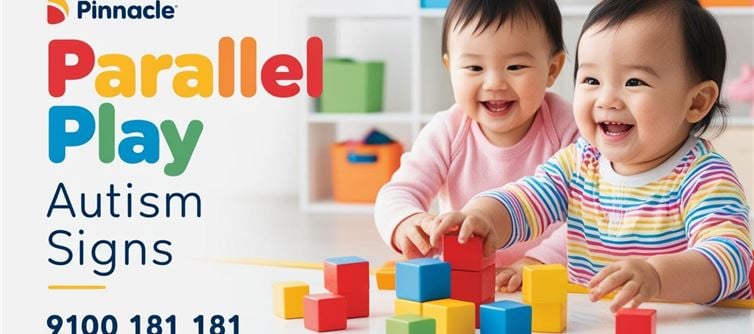
📍 Location: Patna
🧠 Service: Early Social Delay / Autism / Communication Development
📞 Call to Action: AbilityScore©® Social Interaction Screening + TherapeuticAI©® Engagement Plan
“He Was Always Close To Other Children.
Sitting Beside Them. Moving Toys Around.
But He Never Really Played With Them.”
At birthday parties, school events, park outings — Aarav was there.
- He smiled.
- He moved toys around.
- He sat beside kids.
But he never:
- Shared games
- Took turns
- Made eye contact
- Responded when another child said, "Come play!"
“He looked like he was participating.
But really, he was playing alone. In a crowd.”
🧠 Why Being Physically Close Doesn’t Mean Social Connection
At Pinnacle® Patna, developmental therapists explain:
“Many children on the autism spectrum demonstrate parallel play —
where they play near other kids but without genuine social engagement.
The mistake families make is assuming proximity equals connection. It doesn’t.”
Key signs:
- Playing beside, but not with others
- Lack of shared imaginative games
- Ignoring peer invitations to play
- Talking to themselves during group play
- Preferring structured solo activities over unstructured group interaction
“If your child is physically there but socially missing — listen closely.
They might be asking for help without words.”
📞 The Moment His parents Stopped Hoping It Was "Just a Phase"
At his cousin’s birthday, during musical chairs:
- All kids laughed, pulled chairs, shouted happily.
- Aarav walked quietly around them, spinning a toy bus in his hands.
When they called him to join the game — he didn’t hear.
When they guided him to sit — he walked away.
“That night, we realized:
He was standing in a circle — but not part of it.”
They called 9100 181 181 immediately.
The counselor said:
“Let's not wait for connection to happen.
Let’s build it — with understanding, not with pressure.”
They booked a free AbilityScore©® Social Screening.
📊 Aarav’s AbilityScore©® Social Engagement Report
- Parallel Play Participation: 🟢 Green (900/1000)
- Interactive Play Skills: 🔴 red (440/1000)
- Joint Attention Development: 🔴 Red
- Peer Response Engagement: 🔴 Red
He wasn’t antisocial.
He wasn’t unfriendly.
He was socially disconnected — and needed a bridge back.
🤖 How TherapeuticAI©® Helped Him Step Into Real Play
His AI-personalized therapy plan included:
- Turn-taking games (highly structured to build predictability)
- “Give and Take” toy exchange sessions
- Pretend play role-switching with guided facilitation
- Story-based peer play modeling
- Weekly zone tracking: Parallel → Shared → Cooperative play
By week 5:
- Aarav passed a ball back and forth with a friend for 2 minutes
- Joined a simple pretend game without scripting
- Smiled when a peer called his name — and said, "Me too!"
“He didn’t just enter the circle.
He stepped into the center of it — joyfully.”
💬 What His parents Tell Every Family Now
“Don’t confuse being near with being connected.
Presence is not participation.
Look deeper.
Because behind quiet smiles,
some children are playing a lonely game — silently begging to be invited in.”
🌍 This Autism Awareness Month — watch Who They're Really Playing With
If your child: ✅ Plays beside but not with peers
✅ Doesn’t take turns naturally
✅ Struggles with joint imaginative play
✅ Seems alone even in groups
…it’s time to screen for social engagement gaps —
and give them the skills and space to truly join the world around them.
📞 Book Your Child’s Social Play Screening in Patna
📞 Call the Pinnacle® National Autism Helpline: 9100 181 181
🌐 www.Pinnacleblooms.org
📍 patna | Gaya | muzaffarpur | Darbhanga
✅ Free AbilityScore©® Social Interaction Report
✅ TherapeuticAI©® Play Participation Plan
✅ hindi + english Therapists Available
✅ Parent Play Partnership Coaching
⚠️ Disclaimer
This article is intended for informational and awareness purposes only. It is not a substitute for professional medical advice, diagnosis, or treatment. For expert guidance tailored to your child’s needs, please consult a qualified healthcare provider or contact the Pinnacle® national autism helpline at 9100 181 181.




 click and follow Indiaherald WhatsApp channel
click and follow Indiaherald WhatsApp channel